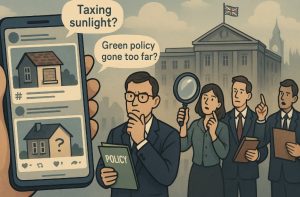Table of Contents
ToggleA 17th-century Levy and Modern Health Policy Collide: is Labour Repeating History in New Disguise?
In 2025, Rachel Reeves Labour’s Shadow Chancellor and now Chancellor found herself at the centre of a media storm. Social media and tabloid outlets buzzed with rumours that she planned to revive the infamous “window tax”, a levy scrapped in 1851. Just as that story began to subside, a fresh wave of backlash erupted, this time surrounding her proposal to extend the sugar tax to include milk-based drinks, dubbed by critics as a “milkshake tax.”
Are these simply sensational headlines, or is Labour ushering in a new era of indirect taxation under the guise of climate and health reform?
Is Rachel Reeves Really Bringing Back the Window Tax?
The short answer is no. But the way the rumour spread reveals a lot about the political and media climate in the UK today.
How Did the Window Tax Rumour Begin?

The phrase “Rachel Reeves window tax” started circulating after Labour’s Green Prosperity Plan was scrutinised by journalists and political opponents. The plan itself proposed stricter energy efficiency regulations for new buildings and incentives to retrofit old housing stock.
Some interpreted these measures to mean that homes with excessive glazing more windows, more heat loss might face higher taxes. From there, the narrative escalated into a claim that Labour would literally tax windows, echoing the 1696 policy under King William III.
This interpretation quickly spread on platforms like X (formerly Twitter), fuelled by memes and politically charged commentary.
What Does Labour’s Housing Policy Actually Say?
Nowhere in Labour’s official publications is there a mention of taxing windows. Instead, the focus is on sustainability:
- Incentives for insulating older homes
- Encouragement of double glazing and smart heating
- Building standards aligned with net-zero emissions targets
Rachel Reeves has publicly dismissed the window tax claims as “nonsense,” pointing to a larger issue of disinformation in political discourse.
What Is the Milkshake Tax, and Why Is It Causing Uproar?
Just as Labour deflected the window tax claims, a more concrete policy emerged—one that has drawn serious criticism across political lines.
What Does the Proposed Milkshake Tax Involve?
Rachel Reeves’ Treasury is considering extending the Soft Drinks Industry Levy (SDIL), first introduced in 2018, to cover high-sugar milk and yoghurt-based beverages. Previously exempt, these drinks are now seen as contributors to Britain’s growing obesity problem.
The extension could lead to:
- Up to 24p increase per litre for affected drinks
- Reformulation pressures on brands like Irn-Bru, Yazoo, and Ribena
- 93% of milk-based drinks needing recipe changes to avoid the levy
A government consultation document justifies the change by citing a continued rise in sugar consumption, which remains twice the recommended level, and a doubling of obesity rates since the 1990s.
Why Is There a Public Backlash?
Critics argue that the levy will hit consumers already struggling with inflation and high grocery prices. More importantly, they claim it violates Labour’s manifesto promise not to increase taxes on working families.
According to GB News, viewers and commentators have accused Reeves of pushing a “nanny-state” agenda. Dr Christopher Snowdon, head of lifestyle economics at the Institute of Economic Affairs, called the plan “absurd,” arguing that:
“Sugar taxes have never worked anywhere. They’ve cost consumers £300 million a year and done little to curb obesity.”
Is Labour Quietly Backtracking on Its Tax Promises?
![]()
What Did Labour Promise During the General Election?
Keir Starmer made clear that a Labour government would not raise income tax, National Insurance, or VAT. While these core tax pledges remain untouched, indirect taxes like the proposed milkshake levy are causing many to question Labour’s intentions.
The window tax rumour, though false, combined with the milkshake tax reality, suggests to some that Labour is relying on stealth taxation to meet fiscal targets.
How Has Rachel Reeves Justified These Policies?
The Chancellor defends the sugar tax extension as a public health initiative, not a revenue grab. According to her October Budget summary and a document authored by Treasury minister James Murray:
- The current sugar threshold allows companies to “hover just below 5g per 100ml”
- Reformulating drinks could have long-term health benefits
- The measure aims to reduce obesity-related NHS costs
Still, industry experts warn that the tax could disproportionately affect families with children, many of whom purchase flavoured milk products as healthier alternatives to fizzy drinks.
How Does This Connect to the Original Window Tax in British History?

The original window tax was introduced in 1696 and intended as a property-based levy: more windows meant a wealthier household, and thus, a higher tax bill. In reality, the tax led homeowners to brick up windows, creating unhealthy living conditions. It remained in force until 1851.
Though Reeves has not proposed a similar tax, the symbolism of taxing sunlight resonates deeply. In a nation historically sensitive to overregulation and indirect taxation, even the hint of such a policy triggers public concern.
What Are the Potential Financial Impacts on Households?
A fair question is: what do these policies actually cost the average person?
| Tax or Proposal | Affected Products | Estimated Price Impact | Policy Goal |
| Window tax (myth) | None – no such proposal | £0 | N/A |
| Milkshake tax (proposed) | Sugary milk/yoghurt-based drinks | Up to 24p per litre | Reduce sugar consumption and obesity |
| Existing sugar tax (SDIL) | Fizzy drinks >5g sugar/100ml | 18–24p per litre | Encourage reformulation by manufacturers |
The cumulative effect of these types of levies, if extended further, could become significant especially for families already navigating a tight household budget.
Is There Broader Public Support for These Initiatives?
Public health groups have voiced support for stronger sugar reduction policies, claiming long-term benefits outweigh short-term costs. However, consumer sentiment appears divided, especially when prices are rising across the board.
Media outlets like The Telegraph and The Guardian offer contrasting views, some praising Labour’s bold stance on obesity, others questioning its economic wisdom and political timing.
In a post-pandemic Britain where food inflation has been rampant and household debt has grown, any policy perceived as a cost burden is likely to be met with scrutiny.
FAQs About Rachel Reeves Window Tax and Milkshake Tax
Has Rachel Reeves proposed an actual window tax?
No, the rumour is false. Labour’s housing policy includes energy standards, not a tax based on window quantity.
What is the milkshake tax proposal?
It’s an extension of the sugar tax to include sweetened milk and yoghurt drinks, aiming to reduce national sugar intake.
How much could milkshake prices increase under the tax?
Estimates suggest up to 24p per litre, depending on sugar content and product reformulation.
Why are people comparing this to the 17th-century window tax?
Because both are perceived as stealthy or unfair taxes on daily life, even though the window tax comparison is symbolic.
Is Labour breaking its no-tax pledge?
Labour denies this, claiming the sugar levy is a health policy. Critics say it undermines the spirit of their pledge.
Has the original sugar tax worked?
Debatable. Some drinks were reformulated, but critics argue obesity rates haven’t improved significantly.
Will other food products be taxed in the future?
Possibly. The Treasury consultation hints that more sugary items could be targeted in later reforms.




